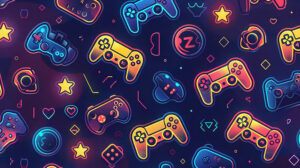
In today’s world, entertainment technology is undergoing a remarkable transformation, radically altering the way people interact with content and each other. These changes go beyond simply improving the quality and availability of content; they are shaping new platforms and interaction models, making entertainment more immersive, interactive and personalised. From streaming services to virtual and augmented reality, today’s technologies offer unlimited possibilities for entertainment, transforming every aspect of leisure into something uniquely personal and immersive. This review aims to explore exactly how entertainment technologies impact our daily lives and perceptions of leisure, highlighting their key features, impact and future developments.
The landscape of entertainment technology today
The entertainment industry is currently facing unprecedented changes defined by the rapid development of technology. These technological innovations are not only pushing the boundaries of classic forms of entertainment, but also creating entirely new ways of interactivity and immersion. In the context of these changes, the entertainment technology landscape today is a dynamic field where innovations are emerging with surprising regularity, offering consumers deeper and more meaningful forms of leisure.
Streaming platforms such as Netflix and Spotify have radically changed the way we consume media, giving access to a vast amount of content at any time and without restriction. Virtual (VR) and augmented reality (AR) technologies are breaking new ground for interactive entertainment, allowing users to not just watch but become part of virtual worlds. The gaming industry is capitalising on these and other technological advances to create complex and engaging environments where players can spend hours exploring, competing and collaborating.
Modern entertainment technologies also encourage social interaction and creative expression through platforms like YouTube and TikTok, where everyone has the opportunity to create and share content with a global audience. These platforms not only provide entertainment, but also serve as a place to share ideas, learn and be inspired.
However, despite the benefits, the evolution of entertainment technology brings new challenges, including privacy issues, the impact on mental health, and the risk of information oversaturation. In this context, understanding the current landscape of entertainment technology and reflecting on its impact on our daily lives and perceptions of leisure becomes key to making the most of these innovations while maintaining balance and wellbeing.
Breakthrough technologies and their role in entertainment
The entertainment industry is constantly changing with the introduction of innovative technologies that are redefining traditional ways of interacting with content. Digital breakthroughs are enriching the consumer experience by offering hitherto unseen immersive and interactive experiences.
Virtual Reality (VR) is one of the most influential entertainment technologies of the last decade. It is a technology that allows users to immerse themselves in completely virtual worlds created by computer graphics. The use of VR headsets in games, movies and educational programmes allows for an unrivalled level of immersion and interactivity.
Augmented reality (AR), in turn, is finding applications in a variety of fields from education to marketing and entertainment, superimposing digital images on the perception of the physical world through devices such as smartphones and specialised glasses. AR applications in the entertainment industry offer a unique hybrid experience, blending reality with fiction and pushing the boundaries of gaming, social media and live performances.
Streaming services have revolutionised the way we access media content, giving users the ability to watch movies, TV shows and listen to music anytime, anywhere. Continuous expansion of content libraries and recommendation algorithms are changing traditional media consumption patterns, making them more personal and rich.
Gaming platforms are also playing a significant role in epitomising technological advances. From virtual reality consoles to cloud-based gaming services, each new generation of gaming systems seeks to improve graphics, reduce load times and provide access to exclusive content, blurring the boundaries between reality and game worlds.
Incorporating these breakthrough technologies into the entertainment industry doesn’t just change the way we perceive and interact with content; they open the door to creating new forms and types of entertainment that previously seemed impossible. It is in these innovations that lies the potential to not only radically change the entertainment industry, but also to transform our everyday experience of interacting with the world around us.
Impact on daily life
The integration of breakthrough entertainment technologies into our daily lives is bringing significant changes to the way we spend our free time, interact with each other and experience the world around us. Such changes affect various aspects of our lives, from strengthening social ties to learning and adopting cultural values.
Thanks to streaming services, the availability of media content has become limitless. This allows users to enjoy a wide range of entertainment anytime and anywhere, which in turn changes habitual consumption patterns. Viewers can now explore different cultures and viewpoints through a global range of films and music, fostering a more open and inclusive society.
Virtual and augmented reality technologies are opening up new horizons for education and skills development. Users can travel virtually to historical locations, conduct challenging training or learn in simulated environments, making learning more visual and engaging.
Gaming platforms and social media encourage audiences to interact and collaborate socially by providing platforms not only for entertainment, but also for sharing experiences, completing group tasks and participating in common interests. This creates a sense of belonging and supports the development of online communities of people with similar interests.
On the other hand, the introduction of these technologies also raises concerns about information oversaturation and ‘digital imbalance’, where excessive use of digital devices and services can have a negative impact on the physical and psychological health of users. The importance of maintaining a healthy balance between the virtual and real worlds is becoming evident, and society is beginning to recognise the need to develop norms and principles to regulate digital leisure activities.
Thus, the impact of entertainment technologies on everyday life is twofold. On the one hand, they enrich the user experience by making entertainment more accessible, diverse and interactive. On the other hand, they require users to consciously plan their time and attention to ensure balance and well-being in the digital world.
Social and psychological aspects
Entertainment technologies not only affect the way we spend our free time, but also have a profound impact on the social and psychological aspects of our lives. This impact can be both positive and negative, depending on the ways in which these technologies are used and integrated into everyday practices.
On the positive side, digital entertainment strengthens bonds by providing friends and families with new ways to interact and socialise regardless of geographical location. Video games and social media platforms support the creation and development of online communities, providing a space for sharing ideas and support among like-minded individuals.
From a psychological perspective, the availability of a wide range of entertainment content can promote relaxation and stress reduction. The use of virtual and augmented reality for educational and therapeutic purposes opens up new perspectives in teaching methodology and psychotherapy, offering tools for more effective interaction and learning.
However, there is a flip side of the coin. Over-immersion in the digital world can lead to social isolation, with virtual relationships replacing real ones. The constant flow of information and the need to be ‘always connected’ can increase feelings of anxiety and stress, especially among young people. It is also worth mentioning the risk of developing addictions to video games and social media, which can have a negative impact on a person’s psychological well-being and daily lifestyle.
The importance of consciously consuming digital content and taking care of one’s own psychological health in an era of technological prosperity becomes obvious. By placing limits on the time spent online and finding time to take a break from screens, users can maximise the benefits of entertainment technologies while avoiding their potentially negative impact on social interaction and psychological well-being.
The future of entertainment technology
Advanced technologies continue to transform the landscape of the entertainment industry, opening up new grants of opportunity and pushing forward predictions about the future of entertainment. With advances in artificial intelligence (AI), machine learning, blockchain and quantum computing, new forms and genres of entertainment are emerging that promise to make the future more personalised, interactive and attainable.
One promising trend is the further refinement of artificial intelligence in creating personalised content. AI can analyse users’ preferences and suggest movies, music or games that best suit their tastes. This will deepen the personalisation of the entertainment experience and make interaction with content more convenient and productive.
Virtual and augmented reality will evolve with increased accessibility and improved quality, creating a more realistic and immersive content experience. This will take streaming services and gaming platforms to a new level of user interaction, breaking down the boundaries between the digital and physical worlds.
Blockchain technology will also play a key role in the future of the entertainment industry, offering new ways to monetise content creators through cryptocurrencies and smart contracts, as well as providing transparency and security in content distribution.
With the growing interest in virtual reality ecosystems, the development of so-called ‘digital doubles’ – virtual copies of real people or objects – is expected. This will open up new opportunities for social interaction and entertainment in virtual worlds.
However, it is important to recognise that upcoming innovations in entertainment technology will also raise new issues regarding privacy, ethics and regulation. A balance will need to be struck between supporting innovation and protecting the rights of consumers and content creators.
In conclusion, the future of entertainment technology heralds a period of exciting transformation in which the boundaries of reality and the virtual world will increasingly blur, providing consumers with unlimited entertainment and learning opportunities. However, the success of these innovations will depend on the industry’s ability to adapt to new challenges and find answers to emerging ethical and social issues.
Frequently Asked Questions (FAQ) box
- What is virtual reality (VR)?
Virtual reality is a computer simulation that allows users to immerse themselves in an artificially created world using special VR headsets or helmets.
How is augmented reality (AR) different from virtual reality?
Augmented reality magnifies the real world by overlaying digital images or information, while virtual reality completely replaces the physical world with a virtual environment.
Can streaming services affect the way we consume television?
Yes, streaming services have already significantly changed the way TV content is consumed, giving users the ability to watch shows and films anytime and anywhere, without having to keep a TV schedule.
What are the potential risks of overuse of entertainment technology?
Overuse can lead to addiction, social isolation, reduced physical activity and negative effects on psychological wellbeing.
What are the main benefits of gaming platforms and social media for users?
Key benefits include the opportunity for social interaction, access to a wide range of games and content, and platforms for self-expression and sharing creativity. - How are artificial intelligence technologies impacting the entertainment industry?
Artificial intelligence contributes to the creation of personalised user experiences, automates content creation processes and improves recommendation algorithms, making content more accessible and relevant to user preferences.
Can entertainment technologies be used for educational purposes?
Yes, virtual and augmented reality technologies are already being used for educational purposes to create interactive and immersive learning programmes, enhancing the learning process and making it more effective.Conclusion
Entertainment technologies have undeniably had a powerful impact on our daily lives, opening up new horizons for interaction, learning and leisure. Over the past decades, we have witnessed significant transformations in the way we consume content, enabled by the rapid development of technologies such as virtual and augmented reality, streaming services and gaming platforms. These innovations have not only improved the availability and quality of entertainment, but have also contributed to the creation of more immersive and personalised user experiences.
At the same time, it is important to recognise and address the potential negative effects of digital over-absorption and strive to maintain a healthy balance between virtual and real-world interactions. Future developments in entertainment technology will continue to change the landscape of the entertainment industry, raising new questions and demanding answers to ethical, social and psychological challenges.
The importance of awareness of the implications and opportunities offered by modern technology cannot be overemphasised. A constant pursuit of innovation and a critical view of its benefits and harms will play a key role in shaping the future of our digital society. By staying abreast of the latest technological advances and considering their impact on our lives, we can maximise the benefits of entertainment without losing sight of the need to look after our own well-being and development.



